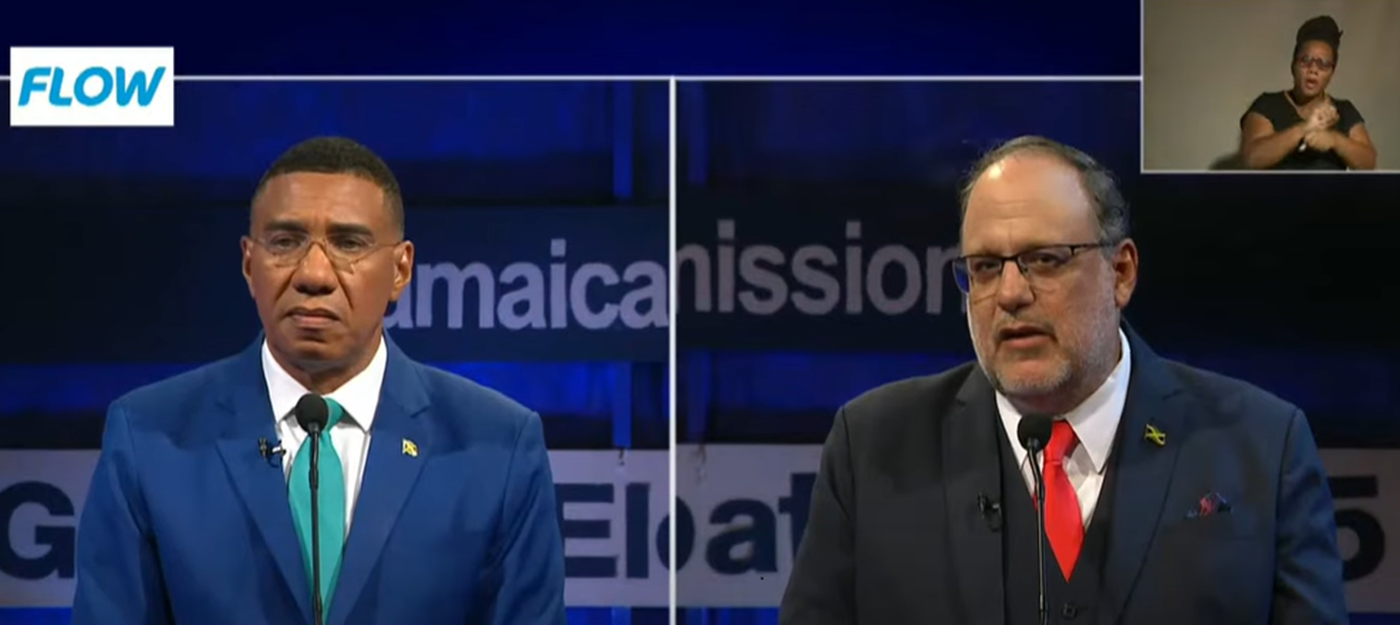Deandrea Hamilton | Editor
Jamaica, August 29, 2025 – The much-anticipated leaders’ debate between Prime Minister Andrew Holness and Opposition Leader Mark Golding turned combative Thursday night, as the rivals clashed over integrity, financial transparency, and the rising cost of living. The second national debate of the campaign season drew sharp barbs, leaving no clear winner but plenty for voters to digest ahead of elections.
Integrity on the Line
Holness, facing renewed scrutiny over his financial declarations, forcefully defended his record. He reminded viewers that the Integrity Commission has certified his annual declarations as proper and stressed that there were “no findings of corruption” against him.
“I am thoroughly transparent … I am not currently under any investigation. There were no findings of corruption or charges. The leader of the opposition continues to weaponize issues because that is the only crutch he has to stand on.”
Holness went further, pointing to an earlier report from the Contractor General that raised questions about Golding’s own business dealings. He accused the opposition leader of hypocrisy, saying the report showed Golding’s operations “benefited from public resources in an irregular way.”
The Prime Minister also hit back at suggestions that he had improperly influenced oversight bodies, noting that his appointments were above board and accusing Golding of distorting facts to score political points.
Golding countered, accusing Holness of hiding behind technicalities while under the cloud of an Integrity Commission referral to the Financial Investigations Division. He pressed the case that Jamaicans could not fully trust a leader facing unresolved questions.
Cost of Living Pressures
In one of the evening’s most relatable exchanges, a question from a social media viewer brought the debate home to kitchen-table issues: the cost of living.
Holness highlighted his government’s record on job creation and social infrastructure, boasting that 280,000 jobs had been created, the minimum wage had been tripled, and hundreds of thousands of Jamaicans had gained access to water and electricity.
“More Jamaicans have income … 350,000 Jamaicans now have access to water, and we will ensure 900,000 more get reliable supply. We have expanded rural transportation and reduced the GCT on electricity — all without adding new taxes.”
Golding shot back that the government’s numbers masked real hardship. He argued that unemployment statistics understate the number of Jamaicans left out of the labor force and pointed to international data showing 55 percent of Jamaicans suffer from food insecurity.
“Statistics don’t tell the full picture. Several hundred thousand Jamaicans are outside the labor force. The UN’s Food and Agriculture Organization says 55% of Jamaicans are not getting adequate nutrition — that is not consistent with prosperity.”
The opposition leader promised targeted relief, including a proposed $10,000 subsidy per rural schoolchild to help families manage transportation costs, one of the major drivers of absenteeism. He also criticized electricity rates, claiming they had nearly doubled under Holness’s leadership.
No Clear Winner
The Jamaica Debates Commission does not declare a winner, and media reaction was mixed. Party surrogates each declared victory, while commentators noted the exchanges underscored two starkly different approaches: Holness leaning on growth, infrastructure, and his integrity defense, and Golding focusing on social equity, cost of living, and accountability.
What is certain is that the fiery tone of the August 28 debate left Jamaicans with a vivid contrast in leadership styles and priorities — and sharpened the stakes for the election ahead.


 News6 days ago
News6 days ago
 Caribbean News7 days ago
Caribbean News7 days ago
 News5 days ago
News5 days ago























